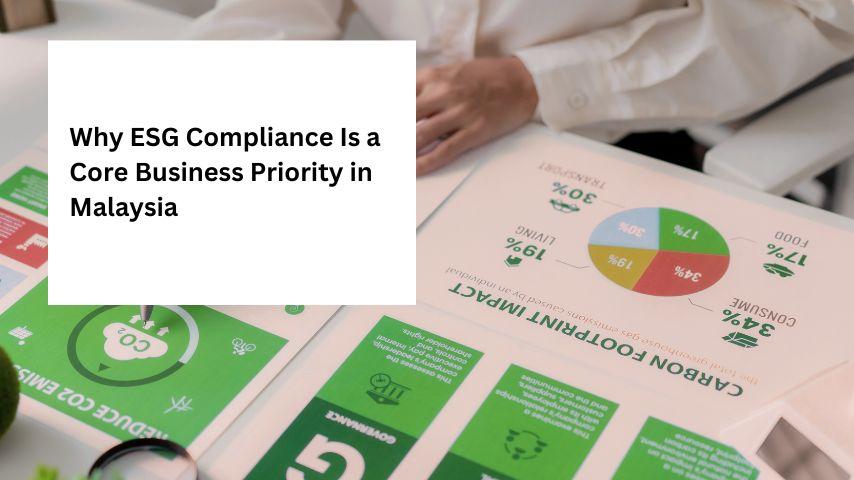Why ESG Compliance Is a Core Business Priority in Malaysia

Environmental, Social, and Governance (ESG) criteria are rapidly shifting from a niche interest to a fundamental component of business strategy. In Malaysia, this transformation is particularly pronounced. Companies across the nation are recognizing that ESG compliance is no longer an optional add-on but a core priority essential for long-term survival and success. This change is driven by a combination of regulatory pressure, investor demand, consumer expectations, and a growing understanding of the real-world risks associated with poor ESG performance.
For business leaders and decision-makers in Malaysia, navigating this new landscape is critical. Understanding the forces behind the ESG movement and integrating its principles into corporate operations is key to building a resilient, competitive, and sustainable enterprise. This article explores why ESG compliance has become a central business priority in Malaysia, examining the key drivers and the tangible benefits of embracing sustainability.
The Regulatory Push: Government and Exchange Mandates
One of the most significant drivers of ESG adoption in Malaysia is the clear direction from regulatory bodies. The Malaysian government and key institutions like Bursa Malaysia have established frameworks that encourage, and increasingly require, businesses to report on their sustainability practices. This top-down approach has created a clear incentive for companies to take ESG seriously.
Bursa Malaysia's Sustainability Reporting Framework
Bursa Malaysia has been a pioneer in promoting ESG within the corporate sector. Its enhanced Sustainability Reporting Framework, which became mandatory for all Main and ACE Market listed issuers, requires detailed disclosures on ESG matters. The framework goes beyond simple reporting, compelling companies to articulate their sustainability strategies, performance targets, and risk management processes related to environmental and social issues.
This requirement has forced companies to look inward and assess their impact. It’s no longer enough to publish a glossy corporate social responsibility report; businesses must now provide concrete data on everything from carbon emissions and water usage to labor practices and board diversity. This level of transparency makes ESG performance a matter of public record, directly impacting a company's reputation and investor appeal.
National Policies and Commitments
The Malaysian government has also set ambitious national goals that align with ESG principles. The Malaysia Madani framework emphasizes sustainability, and the country’s commitment to achieving carbon neutrality by 2050 places significant pressure on industries to decarbonize. Policies like the National Energy Transition Roadmap (NETR) provide a clear pathway for shifting towards renewable energy and sustainable practices. These national sustainability initiatives create a ripple effect, compelling businesses to align their strategies with the government's long-term vision to remain relevant and compliant.
Investor and Financial Sector Demands
The financial world has fully embraced ESG as a critical lens for evaluating investment risk and opportunity. Investors, from large institutional funds to individual shareholders, are increasingly using ESG metrics to screen potential investments. They understand that companies with strong ESG performance are often better managed, more resilient to risk, and better positioned for long-term growth.
Access to Capital and Favorable Financing
In Malaysia, banks and financial institutions are integrating ESG criteria into their lending decisions. Companies demonstrating strong ESG compliance may find it easier to secure loans, often at more favorable rates. Lenders view these businesses as lower-risk investments because they are better prepared for regulatory changes, less prone to environmental liabilities, and more likely to maintain a positive public image. Conversely, businesses with poor ESG track records may face higher borrowing costs or even be denied financing altogether. This direct link between sustainability and access to capital makes ESG a crucial business priority.
Attracting Foreign and Institutional Investment
The global investment community is heavily focused on ESG. Foreign funds are often mandated to invest in companies that meet specific sustainability standards. For Malaysian companies looking to attract international capital, strong ESG credentials are a non-negotiable prerequisite. A robust ESG strategy signals to global investors that a company is forward-thinking, well-governed, and aware of its broader societal and environmental impact. This focus on corporate governance and sustainability is essential for competing on the global stage.
The Growing Power of Consumers and Employees
Modern consumers and employees are more informed and ethically conscious than ever before. Their decisions are increasingly influenced by a company's values and its commitment to social and environmental responsibility. This shift in stakeholder expectations is a powerful force driving ESG compliance in Malaysia.
The Rise of the Conscious Consumer
Malaysian consumers are paying more attention to the origins of the products they buy and the practices of the companies they support. A brand's reputation for sustainability can be a major differentiator in a crowded marketplace. News of environmental damage, poor labor conditions, or unethical business practices can spread rapidly on social media, leading to significant brand damage and boycotts. Businesses that proactively embrace sustainable practices and transparently communicate their efforts can build strong brand loyalty and attract a growing segment of a market that values purpose over price.
Winning the War for Talent
The competition for skilled talent is fierce, and a company's ESG performance plays a vital role in attracting and retaining top employees. Today's workforce, particularly younger generations, wants to work for organizations that align with their personal values. They seek employers who are committed to making a positive impact on the world. A strong ESG program, which includes fair labor practices, diversity and inclusion initiatives, and a commitment to environmental stewardship, can be a powerful recruiting tool. It shows potential hires that a company cares about more than just its bottom line.
Mitigating Risks and Building Resilience
At its core, ESG is a framework for identifying and managing non-financial risks that can have a very real financial impact. By integrating ESG considerations into their strategic planning, Malaysian businesses can build greater resilience and protect themselves from a wide range of threats.
Navigating Climate and Environmental Risks
Malaysia is vulnerable to the physical risks of climate change, including rising sea levels, extreme weather events, and resource scarcity. Businesses that fail to adapt face potential disruptions to their supply chains, damage to their assets, and increased operational costs. Proactive environmental management—such as investing in water-efficient technologies, transitioning to renewable energy, and strengthening supply chain resilience—is not just an ethical choice but a sound business decision. It helps mitigate these physical risks and prepares the company for a future where environmental regulations are likely to become even stricter.
Strengthening Corporate Governance and Social License
The "S" (Social) and "G" (Governance) in ESG are equally critical for long-term stability. Strong corporate governance, characterized by transparency, accountability, and ethical leadership, is the bedrock of a sustainable business. It reduces the risk of corruption, fraud, and mismanagement, which can destroy shareholder value and public trust.
Similarly, maintaining a strong social license to operate is crucial. This involves fostering positive relationships with local communities, ensuring fair labor practices throughout the supply chain, and upholding human rights. Neglecting these social factors can lead to labor disputes, community opposition, and reputational damage that can halt operations and erode profitability.
Conclusion
The evidence is clear: ESG compliance is no longer a peripheral concern for businesses in Malaysia but a central strategic imperative. The push from regulators, the demands of investors, the expectations of consumers and employees, and the urgent need to mitigate risk have converged to make sustainability a core component of modern business.
Companies that view ESG as a mere box-ticking exercise will be left behind. Those that embrace it as an opportunity to innovate, enhance efficiency, strengthen their brand, and build a more resilient organization will be the leaders of tomorrow. For Malaysian business leaders, the task ahead is to embed environmental, social, and governance principles deep within their corporate DNA. By doing so, they can not only ensure compliance but also unlock new avenues for growth, secure their long-term viability, and contribute to a more sustainable and prosperous future for Malaysia.



